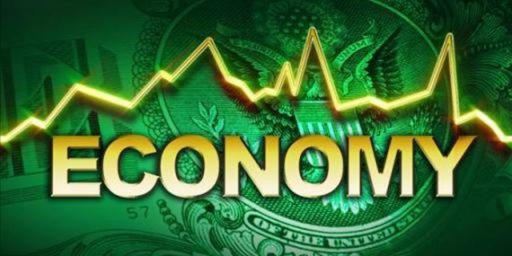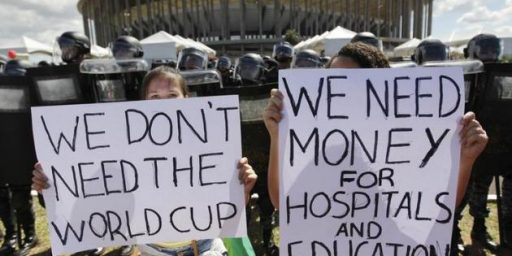Brazil Officially in Recession
The economic news has been poor in Brazil for a while now, and with the release of new GDP figures the country is officially in recession, the BBC reports:
Brazil has entered recession after official figures showed the country’s economy contracted by 1.9% between April and June compared with the previous three months.
Analysts had expected a contraction, but the number was worse than expected.
First quarter output was also revised down to show a 0.7%, rather than a 0.2%, contraction.
Other problematic numbers include:
High interest rates – currently 14.25% – have also affected consumer spending, an important element of Brazil’s economy, while this year, the government has introduced stringent austerity measures designed to tackle high levels of debt.
[…]
In the second quarter, household spending fell by 2.1% compared with the previous three months. The biggest falls came in the industrial sector, where construction output fell 8.4%
[…]
Unemployment has risen rapidly, while inflation over 12 months is running above 9% – twice the government’s target.
And the problems in China are likely to make thing worse, given that China is a major customer for Brazilian commodities.





Ouch.
I spent some time in Sao Palo and I can tell you that for most of the people in that country it has always been in a deep depression. I can have little sympathy for the few middle and upper class people who are now suffering.
Hey @ Andre Kenji …
I know that you will be reading this, and I need to know when:
1) The value of the Real drops compared to the US dollar
2) When real estate prices drop
Why: when I was in Barra da Tijuca, real estate prices went up dramatically as the economy was zooming.
Now, with the economy in recession, prices should be dropping at the beach, and it would be awesome to get a penthouse near Praia do Pepe.
But I know that those who have money in Brasil may not be affected by a recession as much as the average Brazilian.. So, I need to know that magic mark when those will be feeling the pressure as well.
And… if anyone is asking why the heck I care about this… you may wish to see: https://goo.gl/ZqpDSQ
1) Awesome culture,
2) nearly non-existent racism,
3) the “democracy of the beach”
It is one of the best places in the world.
Oh… and one funny fact… The slag for ALL foreigners in Brasil is “Gringos”.
Of course, that really cracked me up with my Mexican coworkers in Brasil, as I could refer to them as Gringos. It made their head spin.
🙂
@Liberal Capitalist: The Real has been plummeting against the dollar for some time now, which shut down most of my Brazillian business, as I was suddenly wy more expensive than I had been. In fact, now a lot of the people I was working with are looking to move to the States — Brazil is just too miserable.
Australia’s economy has been struggling to recover for the last several years. Canada, another major supplier of raw materials, looks like it may be sliding into recession. Russia’s economy has been on the ropes for a while.
Let’s put it this way. Brazil isn’t alone. A lot of China’s major suppliers are having problems.
Germany isn’t exempted, either. GDP growth to date there has been less than 2%.
@Dave Schuler: Australia is hurting in part because of China’s smaller appetite for coal. In Canada the Alberta tar sands operations are shutting down because with the drastic reduction in the price of oil there is no way they can show a profit. Even North Dakota is not immune – the unemployment rate and demand for social services are both on the increase.
@Ron Beasley: Wait, I thought that the miracle of the free market (TM, pending) had eliminated boom/bust cycles?
They lied to us? I’m soooooo disillusioned. 🙁
Unemployment is rising while spending is falling and inflation is untouched. This indicates the central bank’s efforts to reduce inflation via interest rate rises cannot work because overspending is not the problem.
@Liberal Capitalist: The prices of Real Estate are dropping in Reais, so they are even cheaper in Dollars. Rio de Janeiro is still expensive(You don´t have unlimited space to build close to the beach), but you can find a nice apartment in Recreio dos Bandeirantes for 200 thousand dollars).
@wr: They want to move to the United States because they don´t know what is to live without Single Payer healthcare.
@Ben Wolf: The main reason that the government increased interest rates was to keep strong currency, not to fight inflation.
Brazil´s biggest problem in the economy is not “recession” per se, but stagnant growth. In some sense, the country is fine. There is no IMF bailout, unemployment is still at acceptable levels. But the country needs to increase productivity, there is the risk of years and years of very small growth, not unlike Italy.
@Andre Kenji: Attempting to preserve a higher currency value is an anti-inflation measure. If the value falls imports become more expensive.
@Andre Kenji: Raising interest rates to preserve a higher currency value is an anti-inflation measure. If the value falls imports become more expensive.
@Andre Kenji: Defending a high exchange rate is an anti-inflationary measure as a falling price increases costs of imports. President Tombini has also made many public statements to the effect that current monetary policy is intended to break the inflationary spiral. It can’t work, of course.
Ignore the duplicate comments, i was trying to get one past the spam filter.